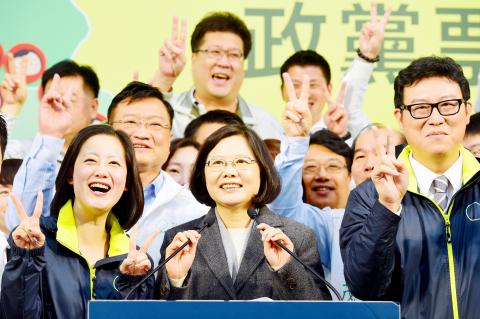Democratic Progressive Party (DPP) presidential candidate Tsai Ing-wen (蔡英文) yesterday issued a “general mobilization order” to all of the party’s staff and elected officials, as she prepared to launch a week-long nationwide campaign tour starting today.
The trip is to start from Fenggang Village (楓港) in Pingtung County’s Fangshan Township (枋山), where her family is from.
From there, she is to work her way around the nation with parades and rallies.

Photo: Lo Pei-der, Taipei Times
Tsai is to arrive in New Taipei City on Friday next week, the day before the election, and she is to have a rally in Banciao District (板橋) before moving on to Taipei to stage an election-eve rally on Ketagalan Boulevard in front of the Presidential Office Building.
Separately yesterday, former Presidential Office secretary-general Yeh Chu-lan (葉菊蘭), who is a Hakka from Miaoli County, said that although Hakka communities in Taoyuan, Hsinchu and Miaoli are traditionally considered Chinese Nationalist Party (KMT) strongholds, she is confident they would turn their support to Tsai in the presidential election.
Yeh, who is also head of Tsai’s Hakka Supporters’ Club, made the remarks at a press conference at Tsai’s national campaign headquarters in Taipei, accompanied by dozens of representatives of overseas Hakka organizations who have traveled to Taiwan to show their support for Tsai and to help organize campaign events.
“In the past, Hakka in the south have been more supportive of the DPP, while those living in the north, mainly Taoyuan, Hsinchu and Miaoli, have been more supportive of the KMT,” Yeh said. “However, this time, things have changed, as Hakka people in the north are also more enthusiastic — to an extent that surprised me — at Tsai’s campaign rallies.”
“The outcome will become apparent in eight days; I am confident it will happen,” she added.
Yeh said that in the past, Hakka were more or less an “invisible” ethnic group, but during the DPP administration from 2000 to 2008, the government pushed for the founding of Hakka TV, the Hakka Affairs Council and institutes for Hakka studies at universities.
“Hakka people have since been more proud to identify themselves as Hakka,” Yeh said.
Despite all the efforts to promote and preserve Hakka culture and identity, the DPP’s support in the three cities and counties with Hakka dominance still rarely goes beyond 40 percent, but there is hope for change this time, Yeh said.
DPP Secretary-General Joseph Wu (吳釗燮) said that in addition to giving its full support to Tsai, the party would like to urge supporters to cast their votes for DPP district and legislator-at-large candidates.
“The KMT proposed to have the majority party form the Cabinet after the legislative elections,” Wu said. “This shows that it still has the ambition to seize the executive power by winning a legislative majority.”
“That’s why we need all of our legislative candidates to win,” he said.

AIR SUPPORT: The Ministry of National Defense thanked the US for the delivery, adding that it was an indicator of the White House’s commitment to the Taiwan Relations Act Deputy Minister of National Defense Po Horng-huei (柏鴻輝) and Representative to the US Alexander Yui on Friday attended a delivery ceremony for the first of Taiwan’s long-awaited 66 F-16C/D Block 70 jets at a Lockheed Martin Corp factory in Greenville, South Carolina. “We are so proud to be the global home of the F-16 and to support Taiwan’s air defense capabilities,” US Representative William Timmons wrote on X, alongside a photograph of Taiwanese and US officials at the event. The F-16C/D Block 70 jets Taiwan ordered have the same capabilities as aircraft that had been upgraded to F-16Vs. The batch of Lockheed Martin

GRIDLOCK: The National Fire Agency’s Special Search and Rescue team is on standby to travel to the countries to help out with the rescue effort A powerful earthquake rocked Myanmar and neighboring Thailand yesterday, killing at least three people in Bangkok and burying dozens when a high-rise building under construction collapsed. Footage shared on social media from Myanmar’s second-largest city showed widespread destruction, raising fears that many were trapped under the rubble or killed. The magnitude 7.7 earthquake, with an epicenter near Mandalay in Myanmar, struck at midday and was followed by a strong magnitude 6.4 aftershock. The extent of death, injury and destruction — especially in Myanmar, which is embroiled in a civil war and where information is tightly controlled at the best of times —

China's military today said it began joint army, navy and rocket force exercises around Taiwan to "serve as a stern warning and powerful deterrent against Taiwanese independence," calling President William Lai (賴清德) a "parasite." The exercises come after Lai called Beijing a "foreign hostile force" last month. More than 10 Chinese military ships approached close to Taiwan's 24 nautical mile (44.4km) contiguous zone this morning and Taiwan sent its own warships to respond, two senior Taiwanese officials said. Taiwan has not yet detected any live fire by the Chinese military so far, one of the officials said. The drills took place after US Secretary

THUGGISH BEHAVIOR: Encouraging people to report independence supporters is another intimidation tactic that threatens cross-strait peace, the state department said China setting up an online system for reporting “Taiwanese independence” advocates is an “irresponsible and reprehensible” act, a US government spokesperson said on Friday. “China’s call for private individuals to report on alleged ‘persecution or suppression’ by supposed ‘Taiwan independence henchmen and accomplices’ is irresponsible and reprehensible,” an unnamed US Department of State spokesperson told the Central News Agency in an e-mail. The move is part of Beijing’s “intimidation campaign” against Taiwan and its supporters, and is “threatening free speech around the world, destabilizing the Indo-Pacific region, and deliberately eroding the cross-strait status quo,” the spokesperson said. The Chinese Communist Party’s “threats